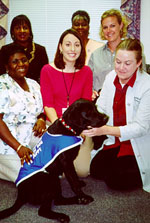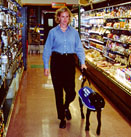Everywhere that Mary is, Lucky's there too
by Katharine HendrixSpecial to The Catalyst
Five months ago, Mary Boatwright got Lucky at the Ridgeland prison.
The very first cuddle convinced her it was the right thing to do, although she was sure hers was only one of many hearts the handsome rascal would steal.
After all, who can resist the charms of a 9-week-old Labrador retriever?
The pair were brought together by Southeastern Guide Dogs Inc., a non-profit
organization that breeds, trains, and places service dogs with visually
impaired people.
“I saw something on Dateline or one of those shows about two
years ago about training guide dogs. So it had been in the back of
my mind for a while. Then last summer, I saw an ad for puppy raisers
in The Catalyst and I applied,” Boatwright said.
After sending in the application, area coordinators Steve and Winnie Clarke interviewed her by phone and brought a dog to visit her home.
“We look to see how they interact and how truly interested the person is in raising a dog like this, because it’s different than raising a pet and it’s a real commitment for a year. But we just fell in love with Mary. Just her whole attitude was great so we knew she would do a wonderful job,” Winnie Clarke said.
Finally, the match was made.
 Lucky
with Mary, second from right, and coworkers Julie Gadsden, from left, Sharon
Hurbert, Amete Latt, Betsy Cook, and Sally Shields.
Lucky
with Mary, second from right, and coworkers Julie Gadsden, from left, Sharon
Hurbert, Amete Latt, Betsy Cook, and Sally Shields.
Lucky and Boatwright were to be a team and she drove to Ridgeland to pick him up from the Clarkes. Although the couple live in Hilton Head, they spend three or more days a week at the Ridgeland Correctional Center running Project IMPACT, which stands for Inmates Providing Animal Care and Training. The program, now in its sixth year, allows carefully selected prisoners to raise guide dogs for the blind.
“The kennels are outside the prison compound so the inmates who raise them are really special. They work with their dogs every day and take them on supervised outings.”
The benefits of the program spread beyond the puppies and their future owners. “It’s so rewarding to see the change in the prisoners. As they come out and work with their dogs more and more, they really gain confidence and self-esteem. They’re so proud of their dogs. Several of them say they’ve never had anything love them back before,” Clarke said.
Although Southeastern Guide Dogs Inc. pays the veterinarian bills and an obedience class, puppy raisers are responsible for buying food and toys, teaching basic commands, and providing as many exposures as possible.
 Mary
Boatwright takes Lucky to the grocery store.
Mary
Boatwright takes Lucky to the grocery store.
“So far, Lucky has gone to the grocery store, some restaurants, the hairdresser, and the doctor,” Boatwright said. She also takes him to her office at the MUSC Prenatal Wellness Center where she is project coordinator for the preconception care resource center.
“That was what I was most nervous about - having him in the office with me. But they’re bred to be calm and he pretty much sleeps all day. Plus he’s really been great for office morale. Everybody loves him and comes in to pet him,” Boatwright said.
One of the most important things for guide dogs to learn is the difference in work and play. When a guide dog is on a leash with the guide dog coat on, it signals that they are working. “He has a personality change when I put the coat on him. He’s just a dog until he puts his coat on—then he’s working, and even though I know it’s hard to resist, people really shouldn’t pet him when he’s working,” Boatwright said.
Boatwright will care for and train Lucky for 14 to 16 months before he goes to the Southeastern Guide Dog headquarters in Palmetto, Fla. There, he will have four months of intensive training and be matched with a student from the school’s residential class.
Dogs are provided free of charge to visually impaired people who apply and go through a 26-day program to learn to work with and care for a guide dog. Owners and dogs are matched on characteristics like personality, speed of walking, and energy level. Puppy raisers like Boatwright are invited to the Southeastern Guide Dog school graduation where they meet the new owner. After that, the puppy raiser cannot have any contact with the dog for at least one year to allow time for the new pair to form a strong bond.
“The worst part is going to be separating from him, but I just have to keep in mind that he’ll be helping a blind person be independent,” Boatwright said.
Clarke adds, “There just aren’t enough trained guide dogs for the blind. I can’t imagine living in darkness and these dogs are their eyes. We hope to raise awareness that people can volunteer to do this. The more raisers we can get, the more dogs we can get out.”
Southeastern Guide Dogs Inc. is also unique in that the organization allows people with certain disabilities to become puppy raisers. “As long as they can care for the dog, it’s OK for someone with a handicap to train a puppy,” Clarke said. “We like to get several people raising puppies in the same area. It forms a good nucleus for them to support each other and do it together,” she said.
As for Boatwright, after only five months with Lucky the benefits are already clear, “It’s the best thing I’ve ever done. I’ll definitely do it again,” she said.
In addition to needing puppy raisers, the organization also needs funds as it operates on private donations. Groups or individuals who raise a donation of $1,200 get to name a puppy. Lucky’s name was chosen by a retirement community in Florida which has named nine dogs to date. Smaller donations are also welcome.
For more information about Southeastern Guide Dogs Inc., to name a puppy,
or to volunteer as a puppy raiser contact area coordinators Steve and Winnie
Clarke at (843) 681-7997 or look it up on the Web at http://www.guidedogs.org.